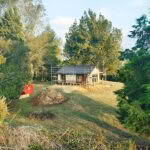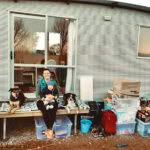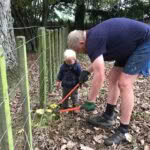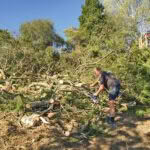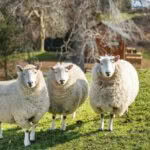Why a bed-and-breakfast was the first addition on this family’s block
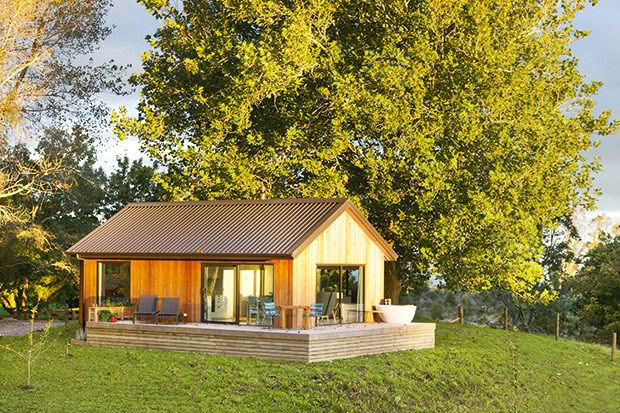
The man who created one of the toughest endurance races in NZ is enjoying a marathon clean-up and new challenges on his Rotorua block.
Words: Nadene Hall Photos: Paul Charteris
Who: Paul Charteris, Sarah Rosenbaum, Colin & Audrey (children), Hazel & Ruby (dogs)
What: Wildberry Cottage bed & breakfast
Land: 3.3ha (8 acres)
Where: Hamurana, 15 minutes north of Rotorua
When Paul Charteris and Sarah Rosenbaum bought their block, it was completely overgrown with weeds and trees. Paul felled the first one during the March 2020 lockdown, then started to chop it up with an axe.
“The neighbour looked over the fence and said ‘yeah, nah mate, you’ll be here until Christmas doing that,’ and lent us his wood splitter. Thank goodness.”
The huge trees dotted across their land include magnificent 40-50 year old specimens, but many were growing too close together, shading out large areas of pasture. “So you go out there early one morning with the chainsaw and think, ‘I’ll knock this off today’, and when you come in at lunchtime, you’ve only touched a quarter of the tree.
“My background is in agricultural science, and I knew something about forestry, but just the sheer size once a tree is on the ground… tidying the damn things up is a massive job.”
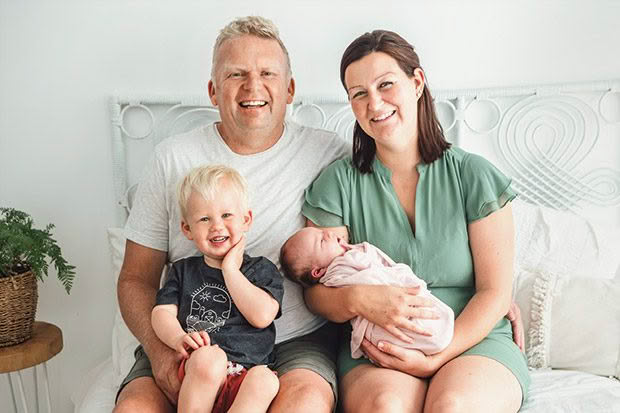
Paul is used to big undertakings. He’s the man who created and ran (literally and figuratively) the Tarawera Ultramarathon, an endurance race covering 165km. The world’s elite trail runners take on rugged forests south-east of Lake Rotorua, including mountains, lakes, waterfalls, a buried village, a redwood forest, and steaming pools. It’s known internationally as one of the most beautiful ‘100 miler’ races in the world.
“We sold the business two years ago to Ironman Corp which is the world’s biggest event organiser. I’m still involved a bit, just being around on race week and helping them sort out things on the ground.”
His new country life has also involved some unusual challenges. He and Sarah wanted to raise their son Colin in the rolling countryside, not on a busy city street where boy racers set up camp every weekend.
“We weren’t even seriously looking to move, but we saw this and jumped on it. It’s a very rare find, covered in really beautiful mature oak and plane trees, maples and sycamores – they’re stonking huge big trees. It’s like an English parkland but it was hopelessly overgrown.”
The biggest trees were taken out by professional contractors, using bulldozers and diggers. The couple’s plans also included building a Scandinavian-inspired bed and breakfast to create a regular income, then their home. But the Covid-19 pandemic and strict lockdowns turned their ambitious plan into what felt like a mountain too far.
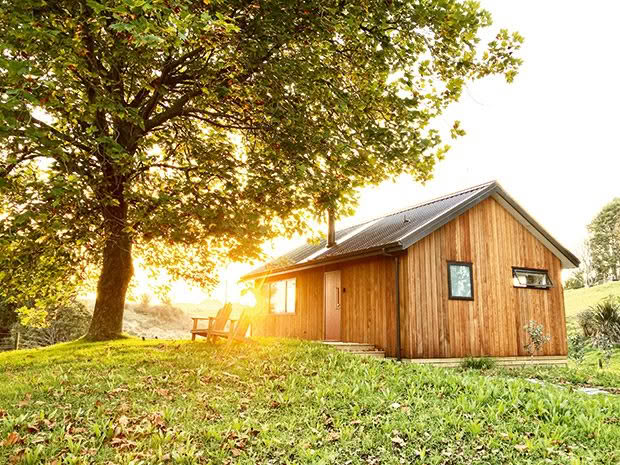
“It was genuinely scary,” says Paul. “We thought without internationals, maybe we’d have no-one coming and staying, but we were committed. All four walls and the roof were on when we went into level 4 (in March 2020). Luckily, it was weather-proofed on the Friday before we went into the big lockdown, and then everything stopped for seven weeks.
“In that time, we did think ‘holy s**t, is anyone going to come and stay?”
In the meantime, Paul, Sarah, baby Colin, and dogs Hazel and Ruby were living in a 20m² tin cabin. It was meant to be temporary but ended up being home for 19 months.
“It was nice and novel for the first six months, then the remaining 14 months was… yeah… it dragged on! Towards the end, every day was an eternity. When we started (building), Colin was nine months old and he grew up in there. Then he could walk, then he could run and he had literally nowhere to go.”
It also meant enduring 570-odd days using an outdoor toilet. “We had a long drop, and I’ve got to credit Sarah, not many women would have put up with it for that long, especially during winter. It’s no fun when there’s howling rain at night and you really need to go.”
However, they couldn’t afford to build their house until the B&B was finished and earning an income. “Lifestyle blocks are mostly about lifestyle, they’re not real money earners for the most part, but having accommodation is one way you can earn a decent amount of money. Living on the property was a lot cheaper than renting a house in town, so we sacrificed a lot of our comfort to be on site and get the project done.”
When the B&B was finally finished in August 2020, the family decided they’d be the first guests.
“We moved from our tin box and thought, ‘finally, a decent place to live, oh the luxury’. We were in there for six days, and we got our first booking for the next night, so we had to move back into our tin box.”
And then, to their delight, the bookings didn’t stop. “It has been amazing,” says Paul. “Sarah manages the whole thing, the interaction with guests, instructions, and bookings. What people like best are the little touches Sarah has added. Like, we have half a dozen walnut trees, so we give them fresh walnuts. She makes homemade bath salts for the outdoor tub. We’ve got a few heritage breed hens, so they get nicely coloured eggs.”
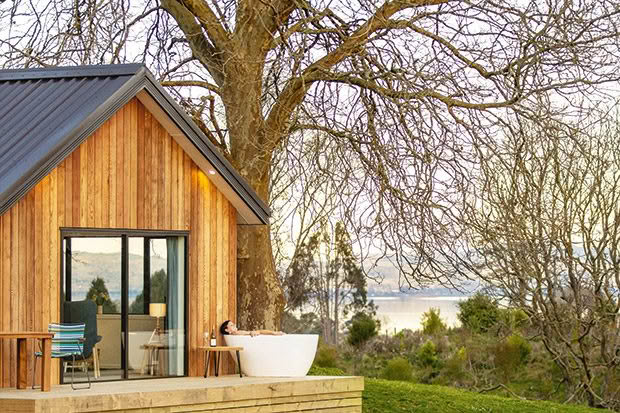
However, Wildberry Cottage itself also hits what Paul calls ‘the sweet spots’ for guests. “It’s a modern Scandinavian-style. My mum is from Finland, so I have that Scandinavian background. Also, Sarah and I had travelled to Norway and Sweden and stayed in a number of B&Bs. We liked the whole look and feel, a cosy, modern, simple style, and it just suited the property beautifully to have an all-wooden exterior.
“There’s quite a lot of rural accommodation (in NZ), but it’s often older farm buildings. We’re able to provide a brand new, warm, dry place.”
Guests tend to spend a lot of time in the outdoor tub and sitting on the deck drinking wine. They love feeding the animals – the cows and sheep whole-heartedly approve – and farm dogs Hazel and Ruby lap up the extra attention.
“As soon as they see guests, they run down there for cuddles and take their tennis ball for a game, but mostly people are kicking back, relaxing, and just enjoying the peace and quiet.”
Being an Airbnb host isn’t a quick way to make money, says Paul, but he’s pleased with their first year. “(Hosting) isn’t going to suit every personality. It requires investment upfront, a fair amount of dedicated work, and you’ve got to be prepared to lose some of your personal freedoms. But it’s made up in the reward of hosting people – we’ve had a wonderful experience.”
Love this story? Subscribe now!
 This article first appeared in NZ Lifestyle Block Magazine.
This article first appeared in NZ Lifestyle Block Magazine.
